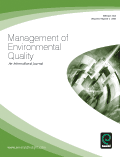
Management of Environmental Quality
Scope & Guideline
Empowering Knowledge to Enhance Environmental Quality
Introduction
Aims and Scopes
- Sustainability and Environmental Management:
The journal prioritizes research that explores sustainable practices in management, emphasizing the integration of environmental considerations into business operations and decision-making processes. - Circular Economy Practices:
A significant focus is placed on circular economy strategies, examining how industries can transition from linear models of production to more sustainable, circular ones that minimize waste and promote resource efficiency. - Impact of Policy and Governance:
Research that assesses the role of environmental policies, governance structures, and regulatory frameworks in promoting sustainable practices is a core area of interest. - Technological Innovations for Sustainability:
The journal encourages studies on technological advancements and innovations that contribute to environmental sustainability, including digital technologies, renewable energy, and waste management solutions. - Consumer Behavior and Environmental Awareness:
Exploring consumer attitudes, behaviors, and awareness related to environmental issues is a critical aspect, aiming to understand how these factors influence sustainable consumption patterns. - Sector-Specific Environmental Challenges:
The journal addresses unique environmental challenges faced by specific sectors, such as agriculture, manufacturing, tourism, and energy, providing insights into tailored solutions for these industries.
Trending and Emerging
- Digital Transformation in Sustainability:
The integration of digital technologies, such as AI and IoT, into sustainability practices is gaining traction, highlighting how these innovations can enhance environmental quality and operational efficiency. - Climate Change Mitigation Strategies:
Research focusing on actionable strategies for mitigating climate change impacts is increasingly prominent, emphasizing the need for adaptive measures in various sectors. - Green Supply Chain Management:
There is a growing emphasis on sustainable supply chain practices, exploring how businesses can reduce their environmental footprint while maintaining efficiency and competitiveness. - Consumer-Centric Sustainability Initiatives:
Studies that investigate consumer motivations and behaviors related to sustainability are on the rise, reflecting the critical role of consumer engagement in promoting green practices. - Interdisciplinary Approaches to Environmental Issues:
An emerging trend is the adoption of interdisciplinary frameworks that combine insights from economics, social sciences, and environmental studies to address complex sustainability challenges. - Circular Economy Innovations:
Research on innovative practices and models within the circular economy is trending, focusing on how organizations can effectively implement circular principles to enhance sustainability.
Declining or Waning
- Traditional Environmental Impact Assessments:
There has been a noticeable decrease in research focused solely on traditional environmental impact assessments, as the field shifts toward more integrated approaches that consider broader sustainability metrics. - Single-Factor Studies:
Papers that examine isolated factors affecting environmental quality without considering the interplay of multiple variables are becoming less common, reflecting a trend toward more comprehensive, systems-oriented analyses. - General Environmental Awareness Campaigns:
Research dedicated to generic environmental awareness campaigns without specific actionable insights or strategies is waning, as the journal seeks more impactful and measurable outcomes.
Similar Journals
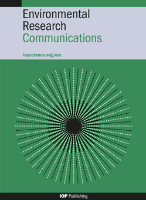
Environmental Research Communications
Fostering collaboration for a greener planet.Environmental Research Communications is a distinguished open-access journal published by IOP Publishing Ltd, focusing on cutting-edge research within the environmental sciences. With an ISSN of 2515-7620, this journal serves as a vital platform for the dissemination of pivotal studies that address urgent environmental issues. Since its inception in 2019, Environmental Research Communications has positioned itself as a reputable source of knowledge, achieving a Q1 ranking in various categories, including Agricultural and Biological Sciences and Earth-Surface Processes, indicating its significant impact in these fields. The journal boasts impressive Scopus ranks, ensuring visibility and recognition among global scholars. With open access options, it encourages a broader readership and fosters collaboration across disciplines, making it an essential resource for researchers, professionals, and students dedicated to advancing the understanding and preservation of our environment.
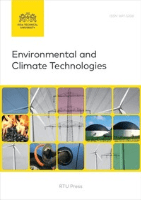
Environmental and Climate Technologies
Empowering Change through Innovative Environmental Research.Environmental and Climate Technologies is a premier open-access journal dedicated to advancing knowledge in the fields of environmental science and renewable energy. Published by SCIENDO since 2009, this journal plays a crucial role in disseminating innovative research and interdisciplinary studies that address the pressing challenges posed by climate change and sustainable development. With its current positioning in the Q2 quartile for Environmental Science (miscellaneous) and Q3 for Renewable Energy, Sustainability and the Environment, it is recognized for its significant contributions to the academic community, ranking #107 out of 233 in General Environmental Science and #161 out of 270 in Renewable Energy. Hailing from Germany and operating under an open-access policy, Environmental and Climate Technologies ensures that research remains accessible to a global audience, fostering collaboration and discussion among researchers, professionals, and students alike. The journal invites rigorous scientific inquiries and practical solutions that can mitigate the impact of climate-related issues, making it a vital resource for those committed to environmental stewardship and sustainability.
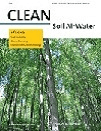
CLEAN-Soil Air Water
Pioneering Discoveries in Pollution and Water ScienceCLEAN-Soil Air Water, an esteemed journal published by Wiley, serves as a vital platform for disseminating research in the fields of environmental chemistry, pollution, and water science and technology. Operating under an Open Access model, it embraces the principles of knowledge sharing, making significant research findings readily accessible to a global audience. With an ISSN of 1863-0650 and an E-ISSN of 1863-0669, the journal has demonstrated its importance in the academic community, reflected in its Scopus rankings within the top quartiles of its categories. Established in 2007 and continuing through to 2024, CLEAN-Soil Air Water offers researchers, professionals, and students an opportunity to explore innovative studies that address pressing environmental challenges, facilitating an exchange of novel ideas and techniques essential for sustainable development. With a publication footprint in Germany and a growing international reputation, this journal is an invaluable resource for those dedicated to advancing the science and practices of environmental stewardship.
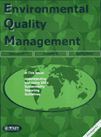
ENVIRONMENTAL QUALITY MANAGEMENT
Advancing the Intersection of Environment and HealthENVIRONMENTAL QUALITY MANAGEMENT is a respected journal published by WILEY, focusing on interdisciplinary studies that merge environmental science with public health, management, policy, and law. Since its inception in 1991, this journal has provided a platform for researchers and practitioners to share innovative insights and advancements in understanding environmental quality and its impacts on human health and the ecosystem. With an ISSN of 1088-1913 and an E-ISSN of 1520-6483, it holds a significant position in the academic community, evidenced by its presence in the Q3 quartile across several categories, including Management, Monitoring, Policy and Law, as well as Pollution and Waste Management. Although it is not an open-access journal, it continues to be a vital resource for those in the environmental sector, offering robust evaluations and discussions that advance knowledge and foster improved practices. With Scopus rankings demonstrating its relevance among other titles in the field, ENVIRONMENTAL QUALITY MANAGEMENT plays a crucial role in shaping discourse and informing policy in an increasingly vital area of study.
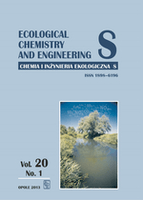
Ecological Chemistry and Engineering S-Chemia I Inzynieria Ekologiczna S
Fostering Interdisciplinary Collaboration for a Greener TomorrowEcological Chemistry and Engineering S, a prominent journal in the field of Environmental Chemistry and Engineering, provides a platform for innovative research and critical discussions surrounding ecological solutions and sustainable practices. Published by SCIENDO, this peer-reviewed journal is accessible to researchers and professionals dedicated to advancing our understanding of ecological systems and sustainable engineering practices. With an ISSN of 1898-6196 and an E-ISSN of 2084-4549, the journal has established itself in the academic community, reflected by its Q3 ranking in both Environmental Chemistry and Environmental Engineering categories as of 2023. Covering significant advancements from 2008 to 2024, it serves as an essential resource in advancing knowledge and fostering collaborations within interdisciplinary fields. Despite not offering open access, the journal remains an invaluable resource for researchers and students aiming to contribute to ecological sustainability strategies worldwide.

International Journal of Environmental Science and Technology
Pioneering research at the intersection of science and technology.International Journal of Environmental Science and Technology, published by SPRINGER, stands as a premier platform for the dissemination of cutting-edge research in the fields of environmental science, technology, and engineering. With an impressive scope spanning from 2005 to 2024, this journal serves as a vital resource for academic and professional communities engaged in tackling pressing environmental challenges. It boasts a strong reputation, evidenced by its Q1 ranking in Agricultural and Biological Sciences and solid placements in Environmental Chemistry and Engineering. Researchers searching for high-impact studies will find the journal's contributions significant, as reflected in its rankings within Scopus: 34th percentile in Agricultural and Biological Sciences and notable standings in Environmental Engineering and Chemistry. Although the journal is not currently an Open Access resource, it maintains a commitment to academic rigor and innovation, making it indispensable for those devoted to advancing knowledge in environmental sustainability and technology.
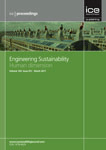
Proceedings of the Institution of Civil Engineers-Engineering Sustainability
Empowering Civil Engineers to Tackle Global ChallengesProceedings of the Institution of Civil Engineers - Engineering Sustainability is a distinguished journal published by Emerald Group Publishing Ltd, focusing on the intersection of civil engineering and sustainability practices. As a Q3 category journal in the field of Civil and Structural Engineering, it offers a critical platform for professionals, researchers, and students to share innovative research that addresses global environmental challenges from 2004 to its forthcoming issues in 2024. With an ISSN of 1478-4629 and E-ISSN of 1751-7680, this journal aims to disseminate vital knowledge regarding sustainable engineering solutions and practices, thereby fostering awareness and prompting action within the discipline. Although not an Open Access journal, it maintains a strong connection to academic and practitioner communities, ensuring high visibility and accessibility through its rigorous peer-review process. Its current Scopus rank places it in the 58th percentile, underscoring its relevance and contribution to the civil engineering domain.
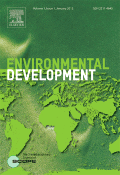
Environmental Development
Empowering scholars to influence impactful environmental strategies.Environmental Development is a premier academic journal published by Elsevier, dedicated to advancing the field of environmental science through interdisciplinary research and innovative practices. With a focus on geography, planning, and development, as well as management, monitoring, policy, and law, this journal provides a rigorous platform for scholars and practitioners to share insights that shape sustainable environmental policy and practice. Holding a prestigious Q1 ranking in both relevant categories and boasting impressive Scopus rankings - 62 out of 821 in Geography and 60 out of 399 in Environmental Science - Environmental Development stands out as a critical resource for those invested in the future of our planet. The journal emphasizes impactful research that addresses contemporary challenges, fostering dialogue across disciplines and geographical boundaries. With a commitment to high-quality research, it offers an important outlet for those aiming to influence environmental policy and developmental strategies globally. Join the growing community of researchers, professionals, and students engaged in promoting sustainable environmental practices through the knowledge shared in this esteemed publication.

Resources Environment and Sustainability
Exploring Innovative Solutions for a Sustainable WorldResources Environment and Sustainability is a premier academic journal published by ELSEVIER, dedicated to advancing knowledge in the fields of environmental science, engineering, and sustainability practices. Recognized for its rigorous peer-review and high-quality research, the journal boasts an impressive impact factor and consistently ranks in the first quartile across multiple categories, including Environmental Engineering, Environmental Science, Management, Monitoring, Policy and Law, and Pollution. With its Scopus rankings placing it among the top journals—#7 in Environmental Science and #12 in Environmental Engineering—this journal provides a vital platform for researchers, professionals, and students seeking to contribute to evolving policies, innovative management strategies, and cutting-edge environmental solutions. Hosted in the Netherlands, Resources Environment and Sustainability is committed to fostering interdisciplinary dialogue and disseminating high-impact research that addresses the pressing challenges of our times. This journal embraces open access principles, ensuring that the wealth of knowledge it publishes remains accessible to a global audience.
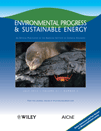
Environmental Progress & Sustainable Energy
Pioneering a path to sustainable energy solutions.Environmental Progress & Sustainable Energy, published by WILEY, is an influential journal dedicated to the crucial fields of environmental science and sustainable energy. Since its inception in 2009, this journal has consistently aimed to advance knowledge and understanding of innovative approaches and technologies that promote sustainability across various sectors. With an impact factor reflective of its strong academic contributions, the journal is catapulted into Q2 and Q3 quartiles across multiple categories, including Chemical Engineering and Environmental Science, demonstrating its central role in the dialogue surrounding pressing environmental issues. Researchers and professionals can access its cutting-edge studies through both traditional and open access options, facilitating the dissemination of knowledge globally. Addressed to an array of stakeholders from academia and industry alike, Environmental Progress & Sustainable Energy is not only a repository of research but also a platform for transformative ideas that aim to pave the way for a more sustainable future, making it an essential resource for those committed to the interplay of environmental stewardship and energy innovation.